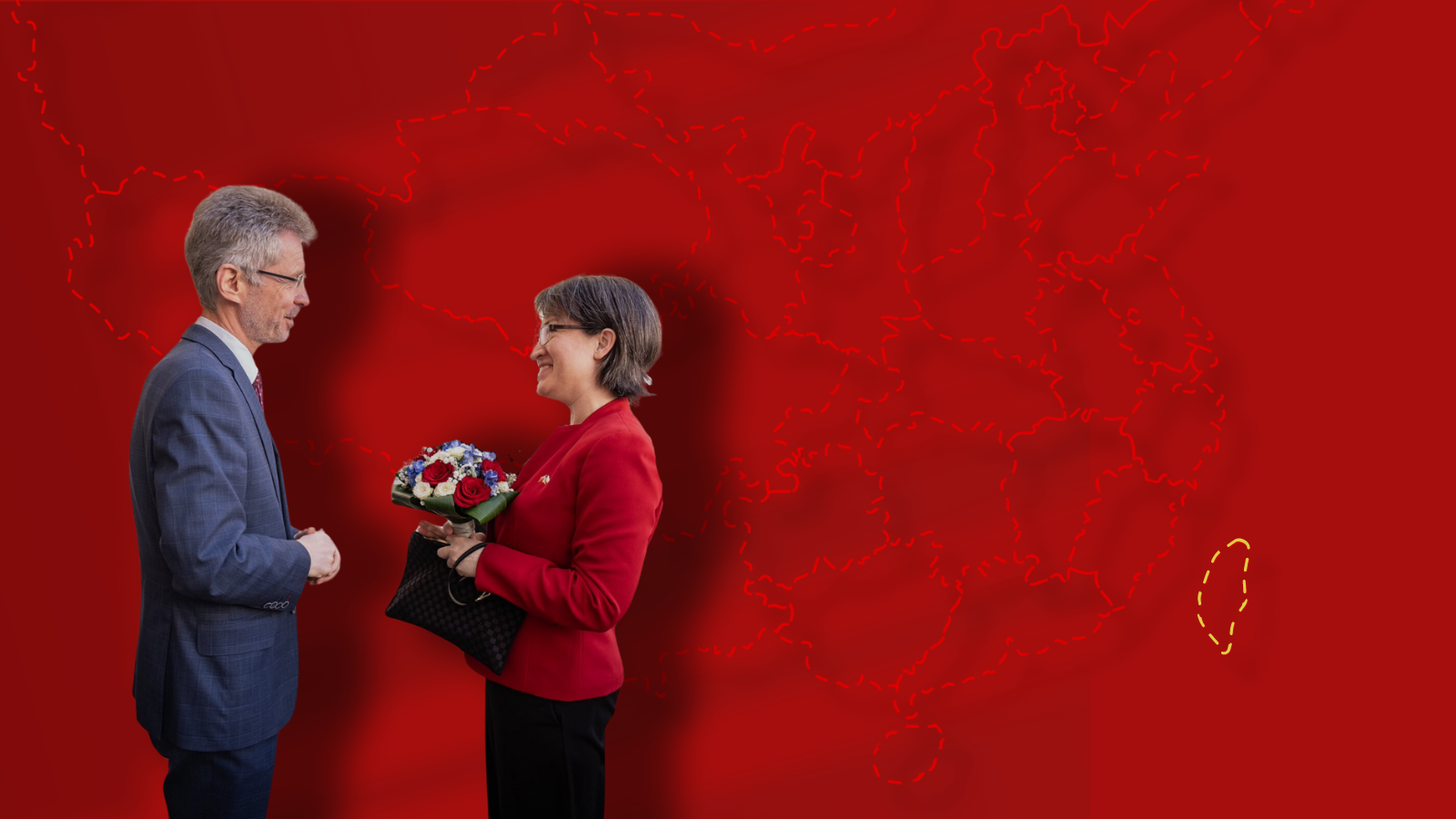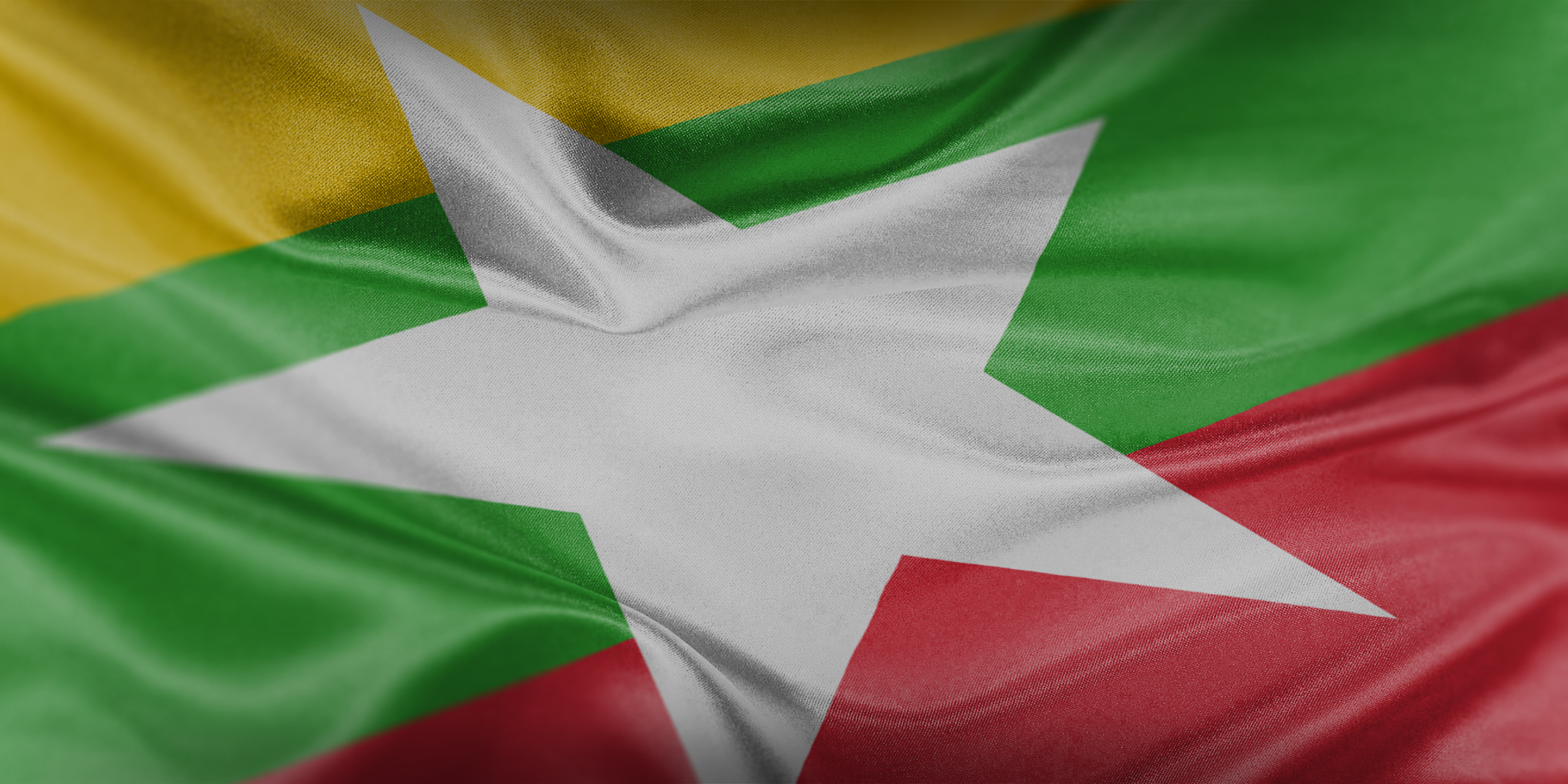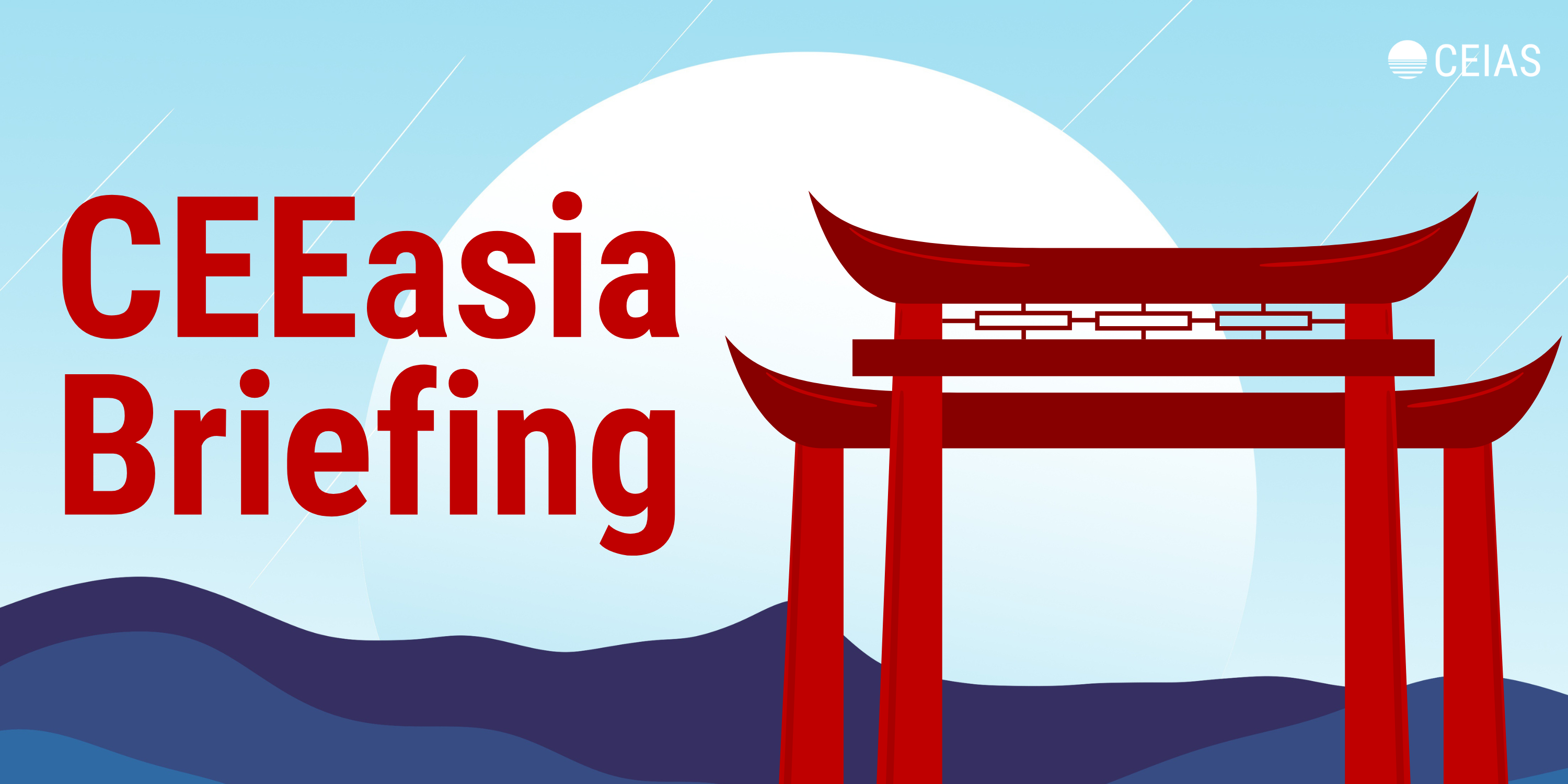As expected, Taiwanese Vice President-Elect Hsiao Bi-Khim’s March 2024 trip to Europe received negative reactions from mainland China, although official responses from Beijing were limited to Hsiao’s meeting with the president of Czechia’s Senate, Miloš Vystrčil. Some major Chinese news sources reshared opinion articles about Hsiao’s meetings with other European officials in Brussels, Vilnius, and Warsaw. In general, Chinese reactions focused on criticizing the supposed “Taiwan independence” (台独) ideology of Taiwan’s ruling Democratic Progressive Party (DPP) and portraying EU officials who met with Hsiao as belonging to small, anti-China cliques that have mere self-serving interests.
According to Taiwan’s Ministry of Foreign Affairs (MoFA), Hsiao’s European trip in March included stops in Brussels, Prague, Vilnius, and Warsaw. In Brussels, Hsiao was received by a European Parliament vice-president, Othmar Karas, and met with a cross-party group of prominent MEPs, including the chair of the European Parliament’s Delegation for Relations with China, Reinhard Bütikofer, and the chair of the European Parliament-Taiwan Friendship Group, Michael Gahler. During his visits to the three Central and Eastern European (CEE) countries, Hsiao gave speeches at various research institutions and think tanks, including Sinopsis (Prague), the Vilnius University Institute of International Relations and Political Science, and the Casimir Pulaski Foundation (Warsaw). At these events, Hsiao met with the Czech Senate President, the Czech Chamber of Deputies Deputy Speaker Jan Bartošek, the speaker of Lithuania’s parliament Viktorija Čmilytė-Nielsen, and the Polish Senate Deputy Marshal Michał Kamiński, according to Taiwan’s MoFA. The chairs of the foreign affairs committees of all three Baltic countries also met Hsiao, according to photographs shared on social media (which were also reproduced in a report by Taiwan’s foreign ministry).
The fact that only Hsiao’s meeting with Vystrčil, the Czech Senate president, received official criticism from China’s Ministry of Foreign Affairs and its Taiwan Affairs Office suggests that, from Beijing’s perspective, the other figures whom Hsiao met during his trip do not match Vystrčil’s seniority. For instance, it indicates that Beijing perceives the vice speaker of Poland’s Senate as a less senior figure. Alternatively, according to some analysts, Poland’s status as a regional power with a strategically important location along the land corridor of the Belt & Road Initiative (BRI) and with a recently elected pro-Western government may explain why Beijing was less focused on Hsiao’s meetings in Poland. Moreover, the fact that Hsiao’s meeting with the speaker of Lithuania’s parliament went uncommented upon by Beijing may signal a potential shift in the Chinese government’s approach to Vilnius after years of tense relations. Beijing’s decision not to react to Hsiao’s meetings with prominent MEPs fits into the PRC government’s general view that the European Union is a secondary institution compared to the EU nation-states, with EU officials being generally less welcome in Beijing than national leaders of member states.
DPP Looking for “Diplomatic Breakthroughs” in Europe?
China’s English-language state-owned media, including CGTN, China Daily, and Global Times, shared summaries of two statements from Chinese state officials. One was from the newly-appointed Ministry of Foreign Affairs spokesperson, Lin Jian, who gave a regular press briefing on March 19, 2024. The other, given on the same day, came from the spokesman for the Taiwan Affairs Office of the Chinese State Council, Chen Binhua. Both spokespeople were reacting to questions about the Chinese government’s views on Hsiao’s Prague visit and his meeting with the Czech Senate President.
CGTN provided a summary of the two officials’ statements, expressing China’s opposition to any official contact between Taiwanese political actors and foreign states. The China Daily article called on Czechia to honor its “One China policy” commitment. Quoting Lin Jian, the article emphasized the commitment made by the Czech government to uphold the “One China policy” in the official bilateral documents it had jointly signed with Beijing. Lin also warned “‘Taiwan independence’ separatists” that history would hold them accountable for their actions, as reported by China Daily. Chen Binhua was quoted urging Czechia to observe the “One China principle” and avoid sending wrong signals to “‘Taiwan independence’ forces”. The article in the Global Times mostly reproduced the same talking points while also including Lin’s warning that whoever intends to create “‘one China, one Taiwan’, will get burned for playing with fire and taste the bitter fruit of their own doing”.
Notably, all three articles condemned the DPP’s supposed intention to push for “Taiwan independence”. Using Chen’s statement, the articles deplored the DPP’s attempts to achieve “diplomatic breakthroughs” abroad, even though it was unclear what such “breakthroughs” would mean. Based on Chinese media reactions to the results of this year’s Taiwanese elections, there is an understanding among Chinese experts that the newly-elected DPP government is unlikely to take a radically pro-independence approach during its upcoming term. According to Chinese analysts of Taiwan’s politics, this is also because of domestic power relations in Taiwan, namely the DPP’s declining popularity, compared with previous elections, and the success of the Kuomintang (KMT) in winning the most seats in the Legislative Yuan. At the same time, Chinese state media continues to accuse the incoming DPP leadership of being in favor of “Taiwan independence” and portrays its interaction with third parties as a means to achieve this supposed aim.
Chinese Online Commentators Take Aim at “Diehard Secessionists” and “Small European Anti-China Cliques”
While the Chinese government’s reactions to Hsiao’s interactions with European officials were not particularly novel, there was a more diverse discussion of this among Chinese online commentators, mainly in blogs focused on Taiwan affairs and international relations, including some with clear links to the Chinese state. Blog posts related to the topic were widely reshared on Baidu and other popular state-linked news platforms.
A newsletter named Wanqu wang Haixia 湾区望海峡 (“Delta Region Looking at the Straits”), which, according to its WeChat profile, is based in Shenzhen, produced several reports on Hsiao’s trip. One of them, titled “Hsiao Bi-khim pays stealthy visit to Europe, for ‘self-amusement’ with small clique of anti-China politicos” (萧美琴窜欧,与一小撮欧洲反华政客“”), is at the top of WeChat searches for “Hsiao Bi-khim visits Europe” (萧美琴访欧州) and has 2,075 reads on WeChat (as of March 28, 2024). It was reproduced by Zhi Xinwen 直新闻 (“Direct News”), a state-owned online news source with 1.43 million Weibo followers (as of March 27, 2024). The WeChat readership of most Zhi Xinwen news items measures in the thousands, with some more popular ones in the tens of thousands.
The first part of the report focused on reproducing accusations that Vystrčil, the Czech Senate President, received US$4 million from Taipei for his visit to Taiwan in 2020. According to Sinopsis, these are unfounded claims spread by a Swiss-based pro-Chinese Communist Party (CCP) organization to discredit Vystrčil after Beijing’s repeated threats that he would “pay a price” for his Taiwan trip. The report argued that the low-key nature of Hsiao’s visit to Europe indicates the DPP’s concern about possible Chinese retaliation and concluded with references to China’s military capabilities in the Taiwan Straits.
Another report by Wanqu wang Haixia, also reproduced by Zhi Xinwen, focused on Hsiao’s visit to Brussels and her meetings with several prominent MEPs. The report argued that the European Parliament’s importance should not be overestimated, especially compared to Europe’s national parliaments. It included the opinion of Cui Hongjian, a professor at Beijing Foreign Studies University’s Academy of Regional and Global Governance and an expert frequently quoted speaking about European affairs by Global Times. In Cui’s view, in recent years, the EU’s stance on China has become increasingly “radical”, fueled by “last-ditch attempts” by some MEPs to leave a “political legacy”. Cui also argues that several official EU-China agreements and official documents reaffirm the EU’s commitment to the “One China” policy and, hence, the actions of the MEPs meeting Hsiao violate such agreements in his view.
An opinion piece that also features prominently in searches on Baidu for “Hsiao Bi-khim visits Europe” is one written by a commentator on international affairs who goes by the pseudonym Fei-Chang Shiye 菲常视野 (“Fei-Chang / Uncommon Perspectives”). According to the author’s Baidu and Douyin profiles, Fei-Chang Shiye is an “associate professor of politics and international relations at the Central China Normal University (Wuhan)” and has been awarded the Baijiabang 百家榜 (Baidu Top 100) influencer award. On Douyin, TikTok’s Chinese counterpart, also owned by ByteDance, the author’s profile has 1.99 million followers (as of March 28, 2024). Fei-Chang Shiye’s opinion piece is titled “After ‘secret diplomacy’ in the US, Hsiao Bi-khim makes stealthy visit to Europe – Foreign Ministry reacts furiously” (赴美搞“秘密外交”后,萧美琴又窜访欧洲,外交部的回应充满杀气). In this piece, Hsiao is described as a “diehard Taiwan secessionist” (顽固台独分子). Meanwhile, the author also warns the reader that Czechia has “anti-China” elements that made Hsiao’s visit possible. The case of China canceling a CZK 5.3 million (US$234,814) agreement to purchase Czech-made Petrof pianos following Vystrčil’s 2020 Taiwan visit is recounted, suggesting that Czechia might face similar retaliatory actions this time. The article concludes by reproducing the statements of China’s MFA and Taiwan Office, urging Czechia to refrain from such actions so that Chinese-Czech relations can “return to the right track” (回归正轨).
Emphasizing the “low-key” nature of Hsiao’s visit
Many of the analyzed sources mock Hsiao for engaging in “stealthy” or “secret” diplomacy. This is used to demonstrate China’s influence over the decisions of the DPP leadership. Zhongguo Taiwan wang 中国台湾网 (Chinese Taiwan Online), a news site belonging to China’s Taiwan Affairs Office, published an article with the title “Before taking office, Hsiao Bi-khim stealthily visits US, Europe under the disguise of ‘fake low-profile’ – What are the secrets of her visits that no one can be told?” (萧美琴在就任前以“假低调”之名窜访美欧,有何不可告人的秘密?). The article criticizes Hsiao for an apparent plot to further the aim of “Taiwan independence” while mocking the DPP for its perceived increasingly low-key approach to foreign interactions, supposedly for fear of retaliation by China.
An opinion piece by a military journalist named DS Beifeng / 北风 (DS Northern Wind), who has 9.9 million followers on Weibo (as of March 28, 2024), expanded on this argument. In an opinion piece published on the online platform NetEase (网易网) with the title “Hsiao Bi-khim plays it big? Colluding with three countries, none of them gives their face to it – Lai Ching-te’s Europe wishes go unfulfilled” (萧美琴玩大了?与三国串通,一国不给面子,赖清德想要的欧洲没给), the author emphasizes that none of the three CEE countries’ leaderships gave official receptions to Hsiao and that her meetings were conducted at various research institutes without official media releases. The accusation that Vystrčil received US$4 million for his 2020 visit is repeated. Lithuania’s 2023 semi-conductor deal with Taiwan is also mocked for being one-sidedly financed by the Taiwanese side, according to the author’s knowledge.
Conclusion
The above-mentioned sources show that Hsiao’s European trip generated only moderate interest from Chinese officials and the general public. Chinese officials only publicly reacted to Hsiao’s meeting with Czechia’s Senate President, suggesting that the second highest-ranking government official of Czechia was seen as a more important figure than Hsiao’s other European hosts. Based on WeChat readership data calculated one week after the visits, the topic generated relatively little interest among the general public, with the most widely read news pieces only having a few thousand readers. The online discourse was largely generated by online influencers with interests in international affairs, including Taiwan affairs and military topics. They sought to paint a negative picture of Hsiao and her European hosts and to threaten the incoming DPP leadership for its perceived pro-“Taiwan independence” stance. Nonetheless, monitoring the reactions to such events is an important way of understanding the general trends of Chinese discourse on the new DPP leadership and Taiwan’s emerging international relations.
Chinese media reactions to Hsiao’s Europe trip suggest that despite all the negativity, Beijing’s “red lines” are not threatened by exchanges between the DPP leadership and European state officials. In recent years, analysts and policy-makers have extensively discussed where Beijing’s “red lines” are when it comes to Taiwan, such as after former US House Speaker Nancy Pelosi’s 2022 visit to Taipei, which resulted in the People’s Liberation Army conducting major military exercises around Taiwan’s main island. Nevertheless, even Pelosi’s visit did not provoke an attempted Chinese invasion of Taiwan. Most experts argue that Beijing’s actual “red lines” would be an official declaration of independence by Taipei and the establishment of US military bases in Taiwan.







